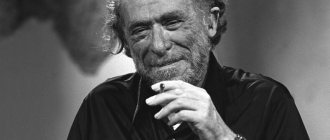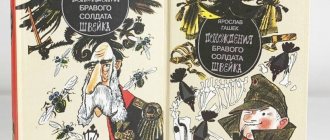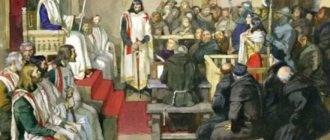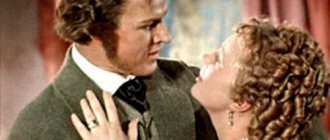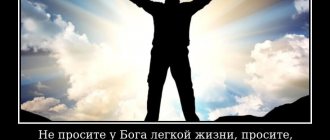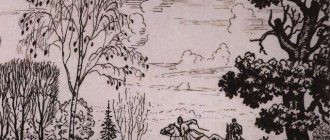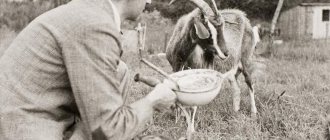Biography
Ilya Ilf was born on October 3, 1897. Then his name was Yechiel-Leib Arievich Fainzilberg. His father was a bank employee - he worked as an accountant in the branch of the Siberian Bank in Odessa. The family had four sons. Yechiel-Leib was third. Ilya Ilf’s homeland is Odessa.
Studied at a technical school. Then he worked in a drawing office, at a military plant, and at a telephone exchange. I also tried myself as an accountant. After the revolution, he became a journalist, then rose to become the editor of humor magazines. Member of the Union of Poets of Odessa. By combining the first and last letters of his difficult-to-pronounce name, he became the writer Ilya Ilf, thereby destroying the father’s dreams of his son’s military career.
After moving to Moscow, he worked for the newspaper Gudok (the publishing organ of railway workers). I got there thanks to a friend from Odessa, Valentin Kataev. Ilya Ilf wrote feuilletons and other humorous and satirical materials. There he met the writers Isaac Babel, Yuri Olesha, Mikhail Bulgakov and Valentin Kataev’s brother Evgeny, who took the pseudonym Evgeny Petrov.
Big book of poems, aphorisms and parables
The parable of the hussar-scheme
The brilliant hussar, Count Alexei Bulanov, was truly a hero of aristocratic Petersburg. The name of the magnificent cavalryman and reveler never left the mouths of the prim inhabitants of the palaces along the Promenade des Anglais and from the gossip columns. Very often, a photographic portrait of a handsome hussar appeared on the pages of illustrated magazines - a jacket embroidered with brandenburs and trimmed with grainy astrakhan, high sleek temples and a short, winning nose.
Count Bulanov gained fame as a participant in many secret duels that had a fatal outcome, obvious romances with the most beautiful, unapproachable ladies of the world, crazy antics against respected persons in society and heartfelt revelries that inevitably ended in the beating of staff members.
The count was handsome, young, rich, happy in love, happy in cards and in inheriting property. His relatives died quickly, and their inheritances increased his already enormous wealth.
He was bold and brave. He helped the Abyssinian Negus Menelik in his war with the Italians. He sat under the large Abyssinian stars, wrapped in a white burnous, and looked at a three-mile map of the area. The light of the torches cast shaky shadows on the count's sleek temples. At his feet sat a new friend, the Abyssinian boy Vaska. Having defeated the troops of the Italian king, the count returned to St. Petersburg together with the Abyssinian Vaska.
St. Petersburg greeted the hero with flowers and champagne. Count Alexei again plunged into a carefree abyss of pleasure.
They continued to talk about him with double admiration, women were hounded because of him, men were jealous.
At the rear of the count's carriage flying along Millionnaya, an Abyssinian invariably stood, causing the amazement of passers-by with his blackness and thin figure.
And suddenly it was all over. Count Alexei Bulanov has disappeared.
The Princess of Belarus-Baltic, the count's last passion, was inconsolable.
The mysterious disappearance of the count caused a lot of noise. The newspapers were full of guesses.
The detectives were knocked off their feet. But it was all in vain. There were no traces of the count.
When the noise was already dying down, a letter came from the Averkiev Hermitage, explaining everything. The brilliant count, the hero of aristocratic St. Petersburg, Belshazzar of the 19th century, accepted the schema. They conveyed horrific details. They said that the count-monk wears chains of several pounds, that he, accustomed to fine French cuisine, now eats only potato peels. A whirlwind of speculation arose. They said that the count had a vision of his dead mother. The women were crying. At the entrance of the Princess of Belarus-Baltic there were lines of carriages. The princess and her husband accepted condolences. New rumors were born.
We waited for the Count to return. They said that this was temporary insanity on religious grounds. It was claimed that the count was fleeing from debt. They said that an unhappy romance was to blame.
But in fact, the hussar became a monk to understand life. He didn't come back. Little by little they forgot about him.
Princess Baltic met an Italian singer, and the Abyssinian Vaska left for his homeland.
In the monastery, Count Alexei Bulanov, who took the name Eupla, exhausted himself with great feats. He really wore chains, but it seemed to him that this was not enough to experience life. Then he invented a special monastic uniform for himself: a hood with a sheer visor that covers the entire face, and a cassock that binds movements.
With the blessing of the abbot, he began to wear this uniform. But even this seemed to him not enough. Overwhelmed by the pride of humility, he retired to a forest dugout and began to live in an oak coffin.
The feat of the schema-monk Euplaus filled the monastery with surprise.
He ate only crackers, the supply of which was renewed for him every three months. So twenty years passed. Eupl considered his life to be wise, correct and the only true one. Life became unusually easy for him, and his thoughts were crystal clear.
He comprehended life and realized that it was impossible to live otherwise.
One day he was surprised to notice that in the place where he had been accustomed to find crackers for twenty years, there was nothing. He didn't eat for four days. On the fifth day, an old man in bast shoes, unknown to him, came and said that the men had burned the landowner, and the Bolsheviks had evicted the monks and set up a state farm in the monastery. Leaving the crackers, the old man left, crying. The schema-monk did not understand the old man.
Bright and quiet, he lay in a coffin and rejoiced in the knowledge of life.
The old peasant continued to carry crackers.
So several more years passed undisturbed by anyone. One day, the door of the dugout opened, and several people, bending over, entered it. They approached the coffin and began to silently examine the elder. These were tall men in boots with spurs, in huge riding breeches and with Mausers in polished wooden boxes.
The elder lay in the coffin, arms outstretched, and looked at the newcomers with a radiant gaze. A long and light gray beard covered half of the coffin.
The strangers jingled their spurs, shrugged their shoulders and left, carefully closing the door behind them.
As time went. Life revealed itself to the schema-monk in all its fullness and sweetness. On the night that followed that day, when the schema-monk finally realized that everything in his knowledge was light, he unexpectedly woke up. This surprised him. He never woke up at night. Thinking about what had woken him up, he fell asleep again and immediately woke up again, feeling a strong burning sensation in his back. Understanding the cause of this burning sensation, he tried to fall asleep, but could not. Something was bothering him. He didn't sleep until morning. The next night someone woke him up again. He tossed and turned until the morning, quietly moaning and, unnoticed by himself, scratching his hands. In the afternoon, getting up, he accidentally looked into the coffin. Then he understood everything. Cherry-colored bugs quickly ran across the corners of his gloomy bed. The schema-monk felt disgusted.
On the same day, an old man came with crackers. And then the ascetic, who had been silent for twenty years, spoke. He asked me to bring him some kerosene.
Hearing the speech of the great silent man, the peasant was taken aback. However, for some reason being ashamed and hiding the bottle, he brought kerosene.
As soon as the old man left, the hermit, with a trembling hand, lubricated all the seams and grooves of the coffin. For the first time in three days, Eupl fell asleep peacefully. Nothing disturbed him.
He lubricated the coffin with kerosene on the following days. But after two months I realized that it was impossible to get rid of bedbugs with kerosene. At night, he quickly turned over and prayed loudly, but prayers helped even less than kerosene. Six months passed in unspeakable torment before the hermit turned to the old man again.
The second request shocked the old man even more. The schema-monk asked to bring him Aragats powder against bedbugs from the city. But “Aragats” didn’t help either.
The bugs multiplied unusually quickly and bit mercilessly.
The schema-monk’s powerful health, which could not be broken by twenty-five years of fasting, was noticeably deteriorating. A dark, desperate life began. The coffin began to seem disgusting and uncomfortable to the schema-monk Euplus.
At night, on the advice of the peasant, he burned the bedbugs with a torch.
The bedbugs were dying, but did not give up.
The last resort was tried - products from br.
Glick is a pink liquid with the smell of a poisoned peach called "Klopin". But that didn't help either. The situation was getting worse. Two years after the start of the great struggle, the hermit accidentally noticed that he had completely stopped thinking about the meaning of life, because he was busy hunting bedbugs around the clock. Then he realized that he was mistaken. Life, just like twenty-five years ago, was dark and mysterious.
It was not possible to escape from worldly anxiety. It turned out to be impossible to live with body on earth and soul in heaven.
Then the elder stood up and quickly left the dugout.
He stood among the dark green forest. It was early, dry autumn. Right next to the dugout, a whole family of porcini mushrooms popped out of the ground. An unknown bird sat on a branch and sang solo. The noise of a passing train was heard. The ground shook. Life was wonderful. The elder, without looking back, went forward.
Now he serves as a coachman at the horse base of the Moscow Municipal Services.
Family
Speaking about the family of Ilya Ilf, first of all, it is worth mentioning his brothers. The elders, like Ilya, threw themselves into creativity, disappointing their father. Sandro Fasini is a famous French cubist artist and photographer. Mikhail Fainzilberg is a Soviet graphic artist and photographer. The younger brother Benjamin lived up to his father's expectations and became a topographical engineer.
The writer met his wife Maria Tarasenko in Odessa. Masha studied at the painting school where Ilya’s brother taught. The artist fell in love with her brother, but soon gave in under the pressure of Ilya Ilf and his attentions. Ilf went to Moscow - the couple corresponded for two years. On one of Maria’s visits, they got married and got a room in Sretensky Lane. The neighbors were Yuri Olesha and his wife. Material well-being and a large apartment with a housekeeper appeared after the release of “The Twelve Chairs.” In 1935, daughter Sashenka was born. Ilya Arnoldovich doted on her, but could not even hug her - he was afraid of infecting his daughter with tuberculosis.
Film adaptations
The books of Ilf and Petrov were so popular that cinema did not bypass them. A large number of films have been shot based on their works. Films based on books by Ilya Ilf and Evgeny Petrov are very popular. World filmmakers still turn to satirical stories!
“The Twelve Chairs” by Ilya Ilf and Yevgeny Petrov, the story of the adventures of Ostap Bender, has been filmed more than 20 times. Foreign filmmakers adapted the novel to local realities, changing the names of the characters and the plot. The Germans made “13 Chairs”, the films “Happiness Is Not in Chairs”, “One of Thirteen” were released in Italy, “Please Sit” was released in England, and “Seven Black Bras” were released in Sweden. In 1971, a two-part film by Leonid Gaidai was released, which was a resounding success. In 1976, Andrei Mironov played Ostap Bender. The film by Mark Zakharov consisted of a large number of musical scenes, which became very popular among the people.
The second part, “The Golden Calf,” was filmed only here. Director Georgy Danelia was the first to take on the novel. In 1958, the short film “Vasisualiy Lokhankin” was released, in which only one scene of the novel was shown. The most popular was the film adaptation by Mikhail Schweitzer. Sergei Yursky starred in the title role, and Leonid Kuravlev, Zinovy Gerdt, and Evgeny Evstigneev worked with him on the set. In 1993, Igor Tolstunov adapted the novel to modern realities and made the film “Dreams of an Idiot.” Bender became a middle-aged bald macho, Shura Balaganov became a gopnik, Panikovsky became a petty intellectual. Most recently, the series “The Golden Calf” was released, starring Oleg Menshikov, Mikhail Efremov, and Fyodor Dobronravov.
"The twelve Chairs"
The novel “The Twelve Chairs” by Ilya Ilf and Evgeny Petrov became their first work. It was written based on an idea by Valentin Kataev, Petrov’s older brother, which the writers developed into a full-fledged adventure novel.
The plot is based on the search for diamonds that are hidden in one of Madame Petukhova’s chairs. Despite the adventurous nature of the plot, many critics argued that the novel provides a global image of the current era. It was this novel that gave us the legendary Ostap Bender, as well as Kisa Vorobyaninov.
Society and criticism greeted the novel with restraint. In 1948, along with The Golden Calf, the novel was banned from publication.
Ilya Ilf – photographer
In the early 1930s, Ilf became seriously interested in photography. He took photographs with a Leica. The writer took thousands of photographs. Among them are many unique ones - photographs of the Cathedral of Christ the Savior before and after the explosion, Mayakovsky's funeral, photographs of famous contemporaries - Mikhail Bulgakov, Boris Pasternak, Yuri Olesha. The book “One-Storey America” is illustrated with his photographs.
After the death of Ilya Ilf, the photo was found by his daughter Alexandra. She put them together and prepared them for publication. This is how the book “Ilya Ilf – Photographer” was born.
LiveInternetLiveInternet
Russian literature is famous for its special tragedy. It is not surprising that, against the backdrop of the general hopelessness of Russian classics, the works of Ilf and Petrov fell in love with the reader so much. Funny phrases from “The 12 Chairs” and “The Golden Calf” have long been used in everyday communication even by those who have not read these books. We present the most famous catch phrases, co-authored by Ilya Ilf and Evgeny Petrov.
When I see this new life, these changes, I don’t want to smile, I want to pray!!! There is no need to fight for purity. We need to sweep! Not a single pedestrian has ever been run over by a car, yet for some reason motorists are unhappy. “Milk and hay,” said Ostap, when the “Antelope” left the village at dawn, “what could be better!” For every good thought there is inevitably a fool who carefully takes it to the point of absurdity. The ice has broken, gentlemen of the jury! We are strangers at this celebration of life. How much is opium for the people? “No, no,” Bender remarked, defending himself with his palm, “don’t hug me.” I'm proud now. You neither drink nor smoke, you are not interested in girls... Why do you need money? You don't know how to spend them. “And then Ostap got sick...” Don’t make a cult out of food. Although we are not in Paris, you are welcome to our hut. You need to part with money easily, without groaning. Panikovsky will sell you all, buy you and sell you again... but at a higher price. Dusya? You make me angry. I am a man exhausted by Narzan. Soon only cats will be born. The time we have is money we don't have.
Take off your hats, bare your heads. The body will now be removed. I will command the parade! There are also sleeves from a vest, a circle from a donkey and ears from a dead donkey. If you can no longer help but worry, then worry in silence. Or maybe you also need the key to the apartment where the money is? Let's go to the city garden. I'll set up a scene for you at the fountain. The young woman was no longer young. Everything told is not fiction. It would be possible to invent something funnier. Act boldly. Don't ask anyone. More cynicism. People like it. Do not do anything through third parties. There are no more fools. I'm certainly not a cherub. I don't have wings, but I respect the Criminal Code. This is my weakness. Fate plays with man, and man plays the trumpet. I'll kill you! I'll take your soul out! Adam was an honest man, he had little understanding of life. I consider the evening of memories closed. He loved and suffered. He loved money and suffered from its lack. Why are you yelling like a polar bear in warm weather?
Kitty! I have long wanted to ask you as an artist: can you draw? I would take it in parts. But I need it right away. By chewing your food thoroughly, you help society. But we don’t need rude people. We are rude ourselves. Girls love young, long-legged and politically literate men. Nobody likes us, except for the criminal investigation department, which doesn’t like us either. Money in the morning, chairs in the evening. Is it possible the other way around? It's possible, but the money is up front. The law of chess is wonderful and immutable: Whoever gains an advantage, even if it is insignificant, In space, mass, time, pressure of forces Only for him a direct path to victory is possible.
Death
In the mid-1930s, Pravda newspaper correspondents Evgeny Petrov and Ilya Ilf went on a trip to the United States, which resulted in a series of essays called “One-Storey America.”
During the trip, Ilf developed tuberculosis, which was diagnosed ten years ago. Therefore, the writers worked separately on One-Storey America. Nevertheless, the unified style developed over 10 years of work helped create a series of unified essays about American life.
Ilya Ilf died in Moscow on April 13, 1937. He lived only 39 years.
Collaboration with Petrov
In 1927, Evgeniy Petrov and I worked together for the first time on the novel “The Twelve Chairs.” The plot for the chronicle was suggested by Valentin Kataev, but the authors were so carried away by its development that they ended up with a full-fledged adventure novel, which Kataev recommended to publish.
The following year, Ilf was fired from the newspaper as a result of downsizing. Petrov followed him. Both became employees of the new magazine “Eccentric” - they made joint reviews of films and performances under the pseudonym “Don Busilio”.
Subsequently, the result of the creative friendship of the writers was a huge number of jointly written stories, essays, short stories, film scripts and, of course, novels. Their success in the Soviet Union was incredible, but nevertheless the writers did not enjoy critical acclaim.
After “Eccentric”, they actively wrote feuilletons for other publications: “Pravda”, “Krokodil”, “Literary Newspaper”.

